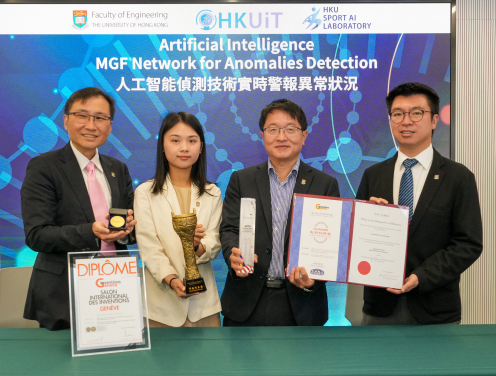The University of Hong Kong has achieved encouraging results at the 48th International Exhibition of Inventions of Geneva, with 19 prizes won by 17 research teams. One of the most promising inventions is the "Artificial Intelligence MGF Network for Anomalies Detection" technology, developed by Dr Wilton Fok's research team from the Department of Electrical and Electronic Engineering's Sports Artificial Intelligence Laboratory, which won two special grand prizes (Invention & Innovation CAI Award and Prize of the Delegation of Malaysia) and a gold medal at the event.
Current artificial intelligence detection technology is limited to specific targets in static images. The Glance and Focus AI Anomalies Detection technology developed by the Sports AI Laboratory can analyse human posture and movements in real-time video, detecting accurately and effectively abnormal situations like falls, fainting, drowning, or violence such as fighting and abuse. The technology can provide timely alerts for rescue efforts and help prevent accidents.
The research team uses artificial intelligence and deep learning to develop an anomaly detection algorithm to detect skeleton joint points for estimations of movements and poses. The system can identify in real time from about seven to eight moving frames in a video, i.e. about one quarter of a second, possible abnormal situations and raise alarm.
In addition, the system performs with the same accuracy and effectiveness for thermal images. It can accurately detect body movements in thermal images without other details, hence protecting personal privacy while detecting anomalies.
The team has established partnerships with relevant organisations for applications of the new technology, e.g. in children and elderly care facilities, and in swimming pools for drowning alerts.
Supported by the Smart Traffic Fund, the team is exploring the feasibility of using thermal images to analyse pedestrian movements and postures at traffic light junctions, to allow for smart extension of the time for those in need such as elderly, children, or people on wheelchair to finish crossing the road. The team also plans to apply the technology at bus terminals to warn against possible dangerous situations involving pedestrians and road users.
"This new technology can save lives. When we developed this technology, we focused on emergency situations and urgent applications in daily life, hoping to provide a more convenient and safe living environment for the general public," said Dr Wilton Fok, Director of the Sports AI Laboratory.
Seventeen HKU research teams from the Faculties of Architecture, Engineering, and Science, and the LKS Faculty of Medicine, and two HKU Inno Laboratories garnered two special grand prizes, one Gold Medal with the Congratulations of the Jury, six Gold Medals, six Silver Medals and four Bronze Medals with their innovations at the 48th International Exhibition of Inventions of Geneva.







